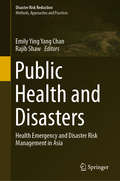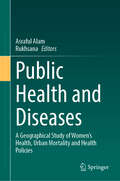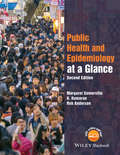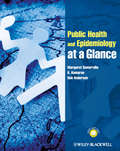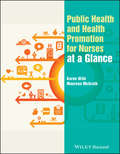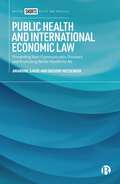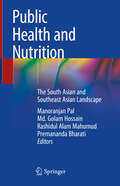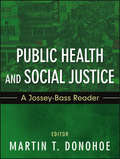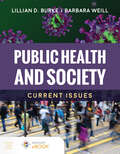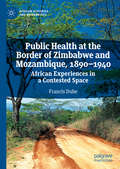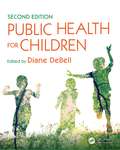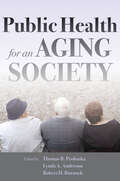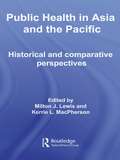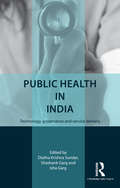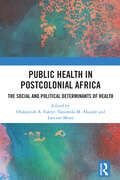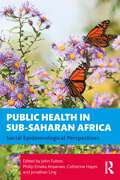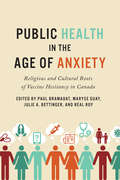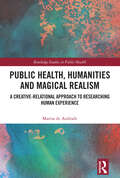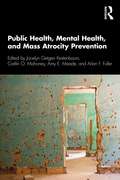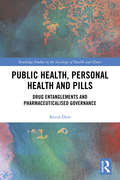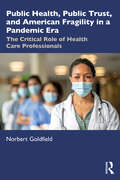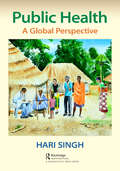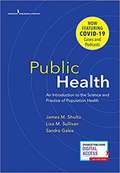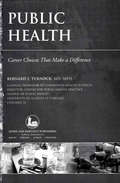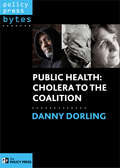- Table View
- List View
Public Health and Disasters: Health Emergency and Disaster Risk Management in Asia (Disaster Risk Reduction)
by Rajib Shaw Emily Ying Yang ChanThis book presents the health emergency and disaster risk management (H-EDRM) research landscape, with examples from Asia. In recent years, the intersection of health and disaster risk reduction (DRR) has emerged as an important interdisciplinary field. In several landmark UN agreements adopted in 2015–2016, including the Sendai Framework for Disaster Risk Reduction 2015–2030, the 2030 Sustainable Development Goals (SDGs), the Paris climate agreement, and the New Urban Agenda (Habitat III), health is acknowledged as an inevitable outcome and a natural goal of disaster risk reduction, and the cross-over of the two fields is essential for the successful implementation of the Sendai Framework. H-EDRM has emerged as an umbrella field that encompasses emergency and disaster medicine, DRR, humanitarian response, community health resilience, and health system resilience. However, this fragmented, nascent field has yet to be developed into a coherent discipline. Key challenges include redundant research, lack of a strategic research agenda, limited development of multisectoral and interdisciplinary approaches, deficiencies in the science–policy–practice nexus, absence of standardized terminology, and insufficient coordination among stakeholders. This book provides a timely and invaluable resource for undergraduate and postgraduate students, researchers, scholars, and frontline practitioners as well as policymakers from across the component domains of H-EDRM.
Public Health and Diseases: A Geographical Study of Women's Health, Urban Mortality and Health Policies
by Rukhsana Asraful AlamThis book provides a multi-disciplinary exploration of gender, public health, and disease with a focus on urban areas impacted by climate change. In three sections, global case studies are provided that analyze health risk management strategies in vulnerable populations containing high rates of mortality and disease morbidity. The sections are broadly divided along the themes, of women's health and gendered health challenges, demographic health issues such as aging populations, and the impacts of urbanization on health and the strategies to improve public health in urban areas such as green space projects. The book will be useful resource for students and researchers of health geography and public health, as well as public health practitioners and policymakers.
Public Health and Epidemiology at a Glance
by Margaret Somerville K. Kumaran Rob AndersonThis brand new title in the market-leading at a Glance series provides a highly-illustrated, visual introduction to the key concepts of population-level disease prevention. Accessible, double-page spreads help you understand and appreciate the determinants of health which impact on healthcare services and their effectiveness. Public Health and Epidemiology at a Glance features high-yield information on all the topics covered at medical school, including: Measurement of population health Epidemiological concepts of cause and association, surveillance, and risk Use of epidemiology in clinical decision-making Epidemiology of major health problems such as cardiovascular disease and cancer Health promotion Basics of health economics Basics of health policy, needs assessment, and evaluation Also featuring self-assessment questions to help test learning, this new title will provide an invaluable resource for medical and healthcare students, junior doctors, and those preparing for a career in public health.
Public Health and Epidemiology at a Glance (At a Glance #72)
by Margaret Somerville K. Kumaran Rob AndersonThis brand new title in the market-leading at a Glance series provides a highly-illustrated, visual introduction to the key concepts of population-level disease prevention. Accessible, double-page spreads help you understand and appreciate the determinants of health which impact on healthcare services and their effectiveness. Public Health and Epidemiology at a Glance features high-yield information on all the topics covered at medical school, including: Measurement of population health Epidemiological concepts of cause and association, surveillance, and risk Use of epidemiology in clinical decision-making Epidemiology of major health problems such as cardiovascular disease and cancer Health promotion Basics of health economics Basics of health policy, needs assessment, and evaluation Also featuring self-assessment questions to help test learning, this new title will provide an invaluable resource for medical and healthcare students, junior doctors, and those preparing for a career in public health.
Public Health and Health Promotion for Nurses at a Glance (At a Glance)
by Karen Wild Maureen McGrathPublic Health and Health Promotion for Nurses at a Glance is the perfect companion for study and revision for nursing students and practitioners. Health promotion is a growing core component of nursing care, and this text combines superb illustrations with accessible information to make the key concepts of health promotion clear and easy to understand. It also provides guidance for how this can be applied in daily practice in all fields of nursing to promote the health of individual patients and communities. Divided into six sections, the first looks at the relationship between the outcomes of public health and the outcomes of nursing, before going on to explore the definitions and different approaches of health promotion.This includes the causes and determinants of morbidity and mortality, and the skills and resources that can support nurses in promoting health with individual patients. It also examines strategies for working with communities to improve health, as well as the ethics of health promotion in nursing. The perfect revision and consolidation textbook Closely linked with the public health outcomes as represented by the NMC, the 6Cs of nursing, essential nursing skills clusters as well as the implications for nursing arising from recent inquiries. Highly visual colour presentation, with full colour illustrations throughout
Public Health and International Economic Law: Preventing Non-Communicable Diseases and Promoting Better Health for All
by Amandine Garde Gregory MessengerAvailable open access digitally under CC-BY-NC-ND licence. Although non-communicable diseases (NCDs) such as cancers, diabetes, and heart diseases are preventable, they have risen dramatically over the last 30 years. This is in part due to increased international trade and foreign direct investment in the tobacco, alcohol and food industries. As governments attempt to regulate these industries, this book raises important and timely questions about the relationship between public health and international trade and investment law. Providing a clear and succinct analysis of the relevant trade and investment regimes and the obligations they impose, this book identifies the key principles that must be considered when formulating and implementing NCD prevention strategies that are both effective and able to withstand legal challenges.
Public Health and Nutrition: The South Asian and Southeast Asian Landscape
by Manoranjan Pal Premananda Bharati Md. Golam Hossain Rashidul Alam MahumudThis book addresses the health status of both mothers and children, highlighting acute malnutrition through anthropometric indices such as weight-for-height, weight-for-age, height-for-age, and BMI. Divided into four sections, it provides an overview of public health and nutrition, presents the state-of-the-art situation in South and South-east Asia, and analyzes real-life data on public health and nutrition not only from India and Bangladesh but also from other countries in South and South-east Asia. The book covers insightful analyses of child nutrition, maternal health, and socioeconomic factors, with an emphasis on maternal empowerment, health-seeking behavior, and healthcare accessibility in diverse contexts. The book also addresses topics such as identification of potential genes for prostate cancer, and quality of life and living arrangements of ageing population. The book is relevant for researchers in the fields of biostatistics, anthropology, demography, health, medicine, and planning, interested in understanding public health and nutrition in South Asia, especially in India and Bangladesh.
Public Health and Social Justice
by Martin DonohoePraise for Public Health and Social Justice"This compilation unifies ostensibly distant corners of our broad discipline under the common pursuit of health as an achievable, non-negotiable human right. It goes beyond analysis to impassioned suggestions for moving closer to the vision of health equity."-Paul Farmer, MD, PhD, Kolokotrones University Professor and chair, Department of Global Health and Social Medicine, Harvard Medical School; co-founder, Partners In Health"This superb book is the best work yet concerning the relationships between public health and social justice."-Howard Waitzkin, MD, PhD, Distinguished Professor Emeritus, University of New Mexico"This book gives public health professionals, researchers and advocates the essential knowledge they need to capture the energy that social justice brings to our enterprise."-Nicholas Freudenberg, DrPH, Distinguished Professor of Public Health, the City University of New York School of Public Health at Hunter College"The breadth of topics selected provides a strong overview of social justice in medicine and public health for readers new to the topic."-William Wiist, DHSc, MPH, MS, senior scientist and head, Office of Health and Society Studies, Interdisciplinary Health Policy Institute, Northern Arizona University"This book is a tremendous contribution to the literature of social justice and public health."-Catherine Thomasson, MD, executive director, Physicians for Social Responsibility"This book will serve as an essential reference for students, teachers and practitioners in the health and human services who are committed to social responsibility."-Shafik Dharamsi, PhD, faculty of medicine, University of British Columbia
Public Health and Society: Current Issues
by Lillian D. Burke Barbara WeillPublic Health and Society: Current Issues analyzes current public health issues in a historical context, while relating them to individual lives. The text emphasizes the social determinants of health, social justice, and the climate crisis, by leading off with these important topics and then integrates them where appropriate throughout the text. Subsequent chapters explore gun violence, the opioid epidemic, tobacco, vaping, and alcohol use, COVID-19, mental health, environmental health chronic disease, emerging and reemerging diseases, and more. Key features “In the News” articles bring public health topics up-to-date and underscore their modern relevance. Personal vignettes humanize public health issues and make them resonate for readers. Short histories put current issues into historical context, for example, the opioid epidemic (Ch. 5) and alcohol and tobacco use (Ch.6) Comprehensive and up-to-date data and references are included throughout the text. Navigate eBook acc
Public Health at the Border of Zimbabwe and Mozambique, 1890–1940: African Experiences in a Contested Space (African Histories and Modernities)
by Francis DubeThis book is the first major work to explore the utility of the border as a theoretical, methodological, and interpretive construct for understanding colonial public health by considering African experiences in the Zimbabwe-Mozambique borderland. It examines the impact of colonial public health measures such as medical examinations/inspections, vaccinations, and border surveillance on African villagers in this borderland. The book asks whether the conjunction of a particular colonized society, a distinctive kind of colonialism, and a particular territorial border generated reluctance to embrace public health because of certain colonial circumstances which impeded the acceptance of therapeutic alternatives that were embraced by colonized people elsewhere. It asks historians to look elsewhere for similar kinds of histories involving racialized application of public health policies in colonial borderlands.
Public Health for Children
by Kathryn KuehenieThis re-titled new edition of Public Health Practice and the School-age Population has been updated and expanded to include children of all ages. Following radical changes in public health provision, Public Health for Children, Second Edition examines the implications for children and young adults as well as for those who provide care, prevention, and health promotion services. It also explores the challenges of these significant structural and functional changes. Chapters are written by experts in the field and take a practical approach in order to support learning and teaching.
Public Health for an Aging Society
by Lynda A. Anderson Robert H. Binstock Thomas R. Prohaska2012 Outstanding Academic Title, Choice MagazinePublic Health and Aging was published to critical acclaim almost fifteen years ago. Much has changed in public health since then. Thomas R. Prohaska, Lynda A. Anderson, and Robert H. Binstock now offer a completely new and updated overview of the field in Public Health for an Aging Society.This comprehensive survey discusses research, policy, and practice; managing and preventing diseases; promoting mental and physical health; and maintaining quality of life for an aging society. The fields of public health and aging have grown increasingly complex. Given the interdependency of issues posed by an aging society, the editors of this volume expand the traditional scope and treatments of public health and aging by adopting a social-ecological perspective that incorporates individual, family, community, societal, and environmental concerns. Chapters address the most critical public health issues facing an aging society, including Medicare and family caregiving, and introduce many new and emerging concepts, such as emergency preparedness, technology in aging, translational research, genomics, and environmental influences on health and health practices.The emergence of an aging society in the United States has far-reaching consequences for every generation. This book provides the latest information and future directions for the public health of this growing population. Students and practitioners will find Public Health for an Aging Society an invaluable resource both in the workplace and the classroom.
Public Health in Asia and the Pacific: Historical and Comparative Perspectives (Routledge Advances in Asia-Pacific Studies #Vol. 11)
by Milton J. Lewis Kerrie L. MacPhersonThe Asia-Pacific region has not only the greatest concentration of population but is, arguably, the future economic centre of the world. Epidemiological transition in the region is occurring much faster than it did in the West and many countries face the emerging problem of chronic diseases at the same time as they continue to grapple with communicable diseases. This book explores how disease patterns and health problems in Asia and the Pacific, and collective responses to them, have been shaped over time by cultural, economic, social, demographic, environmental and political factors. With fourteen chapters, each devoted to a country in the region, the authors take a comparative and historical approach to the evolution of public health and preventive medicine, and offer a broader understanding of the links in a globalizing world between health on the one hand and culture, economy, polity and society on the other. Public Health in Asia and the Pacific presents the importance of the non-medical context in the history of human disease, as well as the significance of disease in the larger histories of the region. It will appeal to scholars and policy makers in the fields of public health, the history of medicine, and those with a wider interest in the Asia-Pacific region.
Public Health in India: Technology, governance and service delivery
by Diatha Krishna Sundar Shashank Garg Isha GargDespite rapid advances in modern medicine and state-of-the-art health care services in the private sector, primary health care in India remains inaccessible to a majority of the population. Besides, even policymakers often do not have access to real-time data to fine-tune their policies or design appropriate research and intervention programmes. Drawing on field experiences, this volume brings together scholars and practitioners to examine public health from different perspectives. It discusses practical and applied issues related to the health sector, especially the role of Information and Communications Technology (ICT); participation of civil society; service delivery; quality evaluation; consumer empowerment; data management; and research and intervention. This book will be useful to scholars, students and practitioners of public health in developing countries such as India. It will also interest policymakers, health care professionals, and departments of public health management and those concerned with community medicine.
Public Health in Postcolonial Africa: The Social and Political Determinants of Health
by Inocent Moyo Olukayode A. Faleye Tanimola M. AkandeThis fascinating, multi-disciplinary collection examines how public health interventions in postcolonial Africa mirror wider manifestations of power in the region. Beyond the role of public health intervention in tackling disease and prolonging life, the book measures the social and political determinant of health which continue to exist in the postcolonial era. The volume features contributions from scholars across both the social sciences and humanities, exploring ongoing debates across a broad range of themes, including: - Infopolitics, biopolitics and healthcare; - Emerging infectious diseases, environment and food cultures; - Health interventions and economic security; - Church administration and healthcare; - Livelihood, sex, sexuality and HIV/AIDS; Offering a fresh and insightful understanding of health issues in this important global region, and including chapters on issues around the Covid-19 pandemic, the book will interest students and researchers across a range of disciplines, including Global Health, Politics and African Studies.
Public Health in Sub-Saharan Africa: Social Epidemiological Perspectives
by John Fulton Jonathan Ling Catherine Hayes Philip Emeka AnwanyuThis fascinating collection shines a social epidemiological spotlight on the key public health issues affecting sub-Saharan Africa today.Beginning with the legacy of colonial rule, this book outlines the complex interplay between population health and a range of social, economic, and cultural factors. It shows how social epidemiological methods can offer a deeper understanding of population health and features chapters on a range of infectious diseases that continue to have a devastating impact on the region, including Sickle Cell Disease, HIV/AIDS, Leprosy, and Ebola. The final section of this book includes a series of case studies in which social epidemiological methods have been used to explore specific public health issues.Providing a timely overview of the relationship between social systems and human biology in the region, this important book will interest students and researchers across Public Health, Medicine, and African Studies.
Public Health in the Age of Anxiety: Religious and Cultural Roots of Vaccine Hesitancy in Canada
by Paul Bramadat Centre for Studies in Religion & Society Julie Bettinger Maryse Guay Rêal RoyPublic Health in the Age of Anxiety enhances both the public and scholarly understanding of the motivations behind vaccine hesitancy in Canada. The volume brings into conversation people working within such fields as philosophy, medicine, epidemiology, history, nursing, anthropology, public policy, and religious studies. Rather than an acrimonious debate between advocates and hesitant patients the contributors critically analyze issues surrounding vaccine safety, the arguments against vaccines, the scale of anti-vaccination sentiment, public dissemination of medical research, and the effect of private beliefs on individual decision-making and public health. These essays model and encourage the type of productive engagement that is necessary to clarify the value of vaccines and reduce the tension between pro and anti-vaccination groups.
Public Health, Humanities and Magical Realism: A Creative-Relational Approach to Researching Human Experience
by Marisa de AndradeThis book calls for a re-conceptualisation of the public health evidence-base to include crucial forms of creative and relational data about people’s lived experiences that cannot be accessed through the biomedical approach to generating and using evidence. Drawing from the author’s ethical, ontological and epistemological dilemmas when studying controversial topics, and methodological evaluation framework to measure impacts of creative community engagement, the book argues that traditional methodologies and conceptualisations of evidence have the potential to exacerbate health inequalities by excluding and misrepresenting minorities. Fantastical realities based on ‘truthful’ research findings are intertwined with traditional public health approaches through artistic engagement with so-called ‘hard-to-reach’ groups. Working with their (sur)real life stories, the author reflects on how the population’s breadth is inadequately reflected which threatens validity and generalisability in public health research and decision making. Through different ways of knowing (epistemology) and different ways of being (ontology), this book shows how to design studies, make recommendations and adapt services that are aligned with views and experiences of those living on the margins and beyond. As such, it is an essential read for public health researchers and students.
Public Health, Mental Health, and Mass Atrocity Prevention
by Jocelyn Getgen Kestenbaum Caitlin Mahoney Amy Meade Arlan FullerThis multidisciplinary volume considers the role of both public health and mental health policies and practices in the prevention of mass atrocity, including war crimes, crimes against humanity, and genocide. The authors address atrocity prevention through the framework of primary (pre-conflict), secondary (mid-conflict), and tertiary (post-conflict) settings. They examine the ways in which public health and mental health scholars and practitioners currently orient their research and interventions and the ways in which we can adapt frameworks, methods, tools, and practice toward a more sophisticated and truly interdisciplinary understanding and application of atrocity prevention. The book brings together diverse fields of study by global north and global south authors in diverse contexts. It culminates in a narrative that demonstrates the state of the current fields on intersecting themes within public health, mental health, and mass atrocity prevention and the future potential directions in which these intersections could go. Such discussions will serve to influence both policy makers and practitioners in these fields toward developing, adapting, and testing frames and tools for atrocity prevention. Multidisciplinary perspectives are represented among editors and authors, including law, political science, international studies, public health, mental health, philosophy, clinical psychology, social psychology, history, and peace studies.
Public Health, Personal Health and Pills: Drug Entanglements and Pharmaceuticalised Governance
by Kevin DewPublic Health, Personal Health and Pills explores the processes and effects of the increasing governance of our lives through pharmaceuticals, looking at the moral, interactional, social and political forces that shape our use of them. It demonstrates the ways in which social relationships and identities are developed, sustained and transformed through medication use. Building on the extensive medicalisation of health literature, and the more recent concept of pharmaceuticalisation, this pioneering book is firmly based on empirical research and sociological theory. It brings together macro considerations of trends in pharmaceutical consumption, regulation and policy, micro considerations of the decision-making and the negotiation of medication use in homes and clinics, and an institutional analysis of the role of drug monitoring agencies, drug subsidising agencies, drug trial methodologies and the media. This book is a contribution to a burgeoning sociological interest in medication use, and will be of interest to a multidisciplinary audience of scholars and students of sociology, science and technology studies, pharmacy and health studies.
Public Health, Public Trust and American Fragility in a Pandemic Era: The Critical Role of Health Care Professionals
by Norbert GoldfieldThis book explores how professionals and policymakers in mental and physical health care can use lessons from the COVID pandemic to better inform future public policy and treatment. Using the United States as a test case, Norbert Goldfield draws on his professional experience in healthcare and policy-making to explore how some societies have emerged from the pandemic with increasing internal conflicts. The author uses excerpts from his own COVID diary to revisit key stages in the response to the COVID pandemic to highlight where division has entered the publish health discourse, and to set out an alternative vision of how mental and physical health can be framed professionally and publicly. In addition to this account, Dr Goldfield details how our political system should change with respect to pandemics and how health professionals, together with the lay public, can help. Specifically, the book highlights the three critical issues confronting American pandemic fragility: increasing vaccinations, decreasing misinformation, and fostering greater linkages between our public and acute health systems. This book will be invaluable for all types of health care professionals, both in mental and physical health arenas, lay people interested in the pandemic, and for policymakers.
Public Health: A Global Perspective
by Hari SinghPublic health is the science and art of improving the health and well-being of communities. Public health interventions go beyond individual healthcare to focus on preventing diseases and injuries, promoting healthy behaviors, and addressing sociocultural, economic, and environmental factors that impact health.While topics of public health, such as maternal health, child health, and epidemiology of infectious and noncommunicable diseases, require familiarity with clinical terms and concepts, the author demystifies medical knowledge to make it accessible to a wider audience. Challenges faced by low-income countries, as well as success stories from developed nations, are included to make the book relevant for global readers.With a focus on essentials and priority issues, the author employs simple and straightforward language to present situational cases that shed light on global public health challenges and possible interventions. To stimulate analytical thinking and encourage readers to approach the subject with scientific rigor, concepts and facts are substantiated with their background, rationale, or application. Readers should be able to relate learnings with their field experience.While this book is primarily for public health practitioners, including community health nurses and physicians, social workers, and health managers, it may be a valuable resource for anyone interested in public health and its application in creating healthier societies.
Public Health: An Introduction To The Science And Practice Of Population Health
by Sandro Galea James M. Shultz Lisa SullivanPublic Health: An Introduction to the Science and Practice of Population Health is a foundational textbook designed for students who are launching their public health studies and preparing for professions in the field. Our health is generated throughout our lives and by the world around us―by where we live, where we work, and who we interact with on a daily basis. This book, therefore, takes a unique approach to teach public health. It combines an eco-social framework with a life course perspective on population health to help the student understand how our experiences and context shape our health and how this informs the practice of public health. Written by leading public health educators, the textbook begins with the foundations―a history of public health and a discussion of the core values of health equity and disease prevention. An engaging survey of the eco-social framework and life course factors affecting health follows. The book concludes with a section dedicated to population health methods, implementation science, community engagement, advocacy, and health promotion. The book is illustrated throughout by cases that cross disciplines, that engage the student with issues of contemporary concern that are the remit of public health, and that offer systematic analyses that point toward solutions. With a focused approach to public health that guides the student through the causes of health―across levels and across stages in the life course―this groundbreaking, first-of-its-kind textbook integrates the core components of the field in clear and lucid language. Timely and relevant case studies, practical learning objectives, discussion questions in all chapters, numerous tables and illustrations throughout, chapter-based podcasts, and more make Public Health an innovative and lively platform for understanding the science of population health and the practice of public health.
Public Health: Cholera to the Coalition
by Danny DorlingThe first digital-only ebook taster of Unequal health: The scandal of our times by Danny Dorling. Competitively priced, it gives a flavour of one of the major themes: public health and contains three chapters from the book, preceded by an all-new introduction specially written by Danny Dorling. This ‘must-read’ will introduce an even wider readership to his work.
